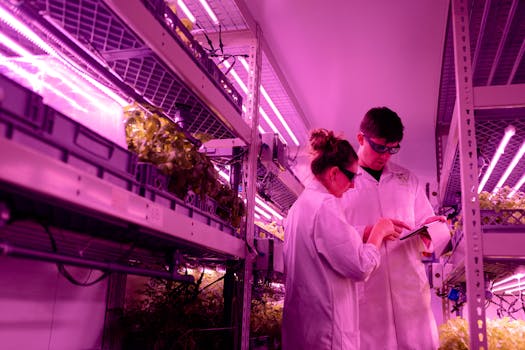Anúncios
The agricultural sector is undergoing a significant transformation, largely due to the increasing integration of digital tools. These innovations are enhancing productivity and efficiency in farming practices. Farmers are harnessing the power of technology to meet the demands of a growing global population.
Digital tools are providing new solutions that address longstanding challenges in agriculture. By leveraging data, farmers can make informed decisions, leading to better yield and resource management. As such, the impact of these tools is vital for sustainable farming.
As we explore the impact of digital tools on agriculture, we will address various aspects, from precision farming to data analytics. Understanding these advancements can help stakeholders appreciate the breadth of technology’s role in modern agriculture.
Precision Agriculture: A New Era of Farming
Precision agriculture utilizes information technology to ensure crops receive exactly what they need for optimal health and productivity. This method allows for real-time analysis of multiple factors affecting crop growth.
With GPS technology and remote sensing, farmers can monitor field variability. They can adjust inputs like water, fertilizers, and pesticides according to specific crop requirements. This leads to more efficient resource use.
Anúncios
Moreover, precision agriculture reduces waste, resulting in cost savings. By applying resources only where necessary, farmers can significantly lower operational costs while increasing yields. Technology helps create more precise farming methods.
Farmers using precision agriculture report higher productivity levels and lower environmental impact. By minimizing excess usage of inputs, they’ll contribute to sustainable agricultural practices. This results in healthier ecosystems and reduces runoff pollution.
Ultimately, precision agriculture proves that technology can lead to smarter and more sustainable farming. This transformation is crucial for addressing the future needs of food security and environmental conservation.
Anúncios
Data Analytics: Driving Informed Decisions
Data analytics is revolutionizing how farmers make decisions by providing insights about weather patterns, soil health, and crop performance. By analyzing this data, farmers can identify trends and predict outcomes.
Using data analytics, farmers have access to comprehensive views of their operations. This enables them to make data-driven decisions, optimizing yield and minimizing risks. Implementing these tools enhances overall farm management.
Moreover, with advancements in artificial intelligence, predictive analytics is becoming increasingly common. Farmers can forecast market trends, allowing for better planning and resource allocation. This proactive approach contributes to operational efficiency.
Adopting data analytics requires investment, but the long-term benefits can outweigh the initial costs. Farmers often experience improved profitability and sustainability as their practices become informed by real-time data.
Data-driven decision-making is a key element in modern agriculture, allowing for greater responsiveness and adaptability in an ever-changing market landscape. This adaptability ensures that agriculture can meet future challenges head-on.
The Role of Drones in Modern Farming
Drones have emerged as invaluable tools in agriculture, enhancing efficiency and productivity. They provide aerial imagery and insights that ground-based tools cannot capture. This overhead perspective improves monitoring capabilities.
Farmers can use drones to assess crop health, identify pest infestations, and monitor irrigation systems. This timely information enables quicker responses to potential issues. Such proactive management can save time and resources.
Additionally, drones can assist in precision application of fertilizers and pesticides. By targeting specific areas, farmers can reduce waste and ensure effective treatment. This precision helps protect both crops and the environment.
Using drones also minimizes labor costs and increases safety. Farmers can gather data from hard-to-reach areas without risking injury or employing extensive labor resources. This efficiency aids in faster decision-making.
As drone technology continues to advance, its role in agriculture is likely to grow. The benefits seen today will only further enhance productivity and sustainability in farming practices.
Smart Irrigation Systems: Conserving Water
Water management is a critical aspect of farming, and smart irrigation systems are transforming how water is utilized. These systems employ sensors and data analysis to optimize water use.
By automating irrigation based on real-time soil moisture data, farmers can reduce water waste significantly. This ensures that crops receive the right amount of water at the right time, enhancing overall growth.
Smart irrigation technologies not only conserve water but also lower operational costs. As water becomes scarcer due to climate change, such innovations are essential for sustainable agricultural practices.
Furthermore, these systems can be integrated with weather forecasting data. Farmers can adjust irrigation schedules based on predicted rainfall, helping them make informed decisions about water usage.
Ultimately, smart irrigation systems exemplify the harmonious blend of technology and nature, paving the way for a more sustainable agricultural future as water conservation becomes increasingly vital.
Farm Management Software: Streamlining Operations
Farm Management Software (FMS) simplifies the complexities of managing a farm by offering digital solutions for planning, monitoring, and analyzing all activities. This integration leads to improved organizational efficiency.
With FMS, farmers can track inputs, manage inventory, and optimize labor deployment. This software allows for streamlined operations, ensuring that every aspect of the farm is well-coordinated.
Moreover, FMS can help with financial management, offering insights into costs and potential profits. By analyzing financial data, farmers can make informed decisions regarding investments and expenditures.
Additionally, many farm management systems offer mobile platforms, enabling farmers to access data wherever they are. This mobility enhances responsiveness and allows for real-time decision-making, contributing to operational efficiency.
As technology continues to evolve, Farm Management Software will play a crucial role in modern agriculture, ensuring that farmers remain competitive and sustainable in an ever-evolving market landscape.
Sustainable Practices Enhanced by Digital Tools
The integration of digital tools in agriculture promotes sustainable practices that benefit both the environment and farmers. These innovations facilitate resource conservation while enhancing productivity.
For instance, precision agriculture decreases resource waste by applying inputs efficiently. This not only reduces costs but also minimizes environmental impacts, creating a win-win scenario for farmers and ecosystems alike.
Furthermore, the data collected by digital tools can be used to identify and address various sustainability challenges. Farmers can make adjustments to improve soil health, biodiversity, and overall ecosystem resilience.
These technologies also support crop rotation and diversification, two essential practices for maintaining soil fertility. Through improved management, farmers can enhance long-term productivity and sustainability.
As digital tools continue to evolve, their potential for promoting sustainable agricultural practices will only increase. The future of farming lies in adopting innovative technologies that benefit both farmers and the planet.
Conclusion: Embracing the Future of Agriculture
The impact of digital tools on agriculture is profound, transforming traditional farming practices into innovative, efficient methodologies. These technologies are essential for addressing future food security challenges.
Farmers who adopt digital tools position themselves at the forefront of modern agriculture, benefiting from increased productivity and sustainability. As these tools continue to evolve, so too will their potential for enhancing farming practices.
Embracing digital agriculture helps streamline operations, manage resources wisely, and improve overall farm management. This adaptability ensures that agriculture can effectively meet the demands of a growing population.
As stakeholders acknowledge the importance of these innovations, the agricultural sector can thrive sustainably. Collaboration among farmers, technology providers, and policymakers is vital for advancing these solutions.
Ultimately, the future of agriculture will be defined by the integration of technology and innovation, paving the way for a sustainable and efficient farming landscape that benefits all.



